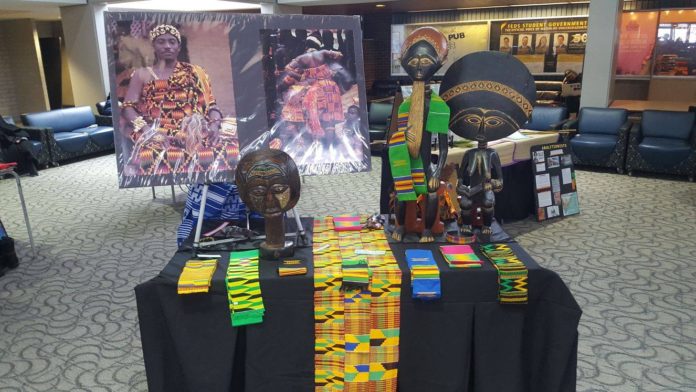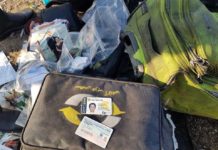Koffi Olomide’s Afrobeat sound flowed through the Student Life Centre’s front hall.
“This is the music I grew up listening to,” Elisa Umuhoza, the vice president of the University of Waterloo’s Black Association for Student Expression (BASE), said. She smiled as more and more curious onlookers weaved through the exhibits to read about and interact with the Ghanaian artifacts.
With the support of the UW Department of History, BASE’s Black History Month Expo on Feb. 15 featured a vast and diverse set of cultural relics from the collection of Thomas “The SheaButterMan” Amoah and his wife Juli. The couple has been selling pure
shea butter and black soap products in the GTA for almost 30 years since Thomas brought awareness about the benefits of shea butter to Canadians. Umuhoza recounted how she met Thomas and Juli while they were selling their products in the SLC and asked them to feature their artifacts in the expo.
The bright and beautiful colours of Ghana, sometimes called the “Gold Coast,” could be found on almost everything, from the cotton kente cloths to the intricate beadwork on Ashanti warrior masks. Juli’s enthusiasm for African history was apparent as she explained the significance of every artifact she passed. She picked up the djembe drum.
“This is a healing drum,” she said. “It’s the heartbeat.”
She then pointed to the object beneath the drum, a circular wooden mask carved into a face with an open mouth. “And this is a moon mask. It has feminine energy.”
Almost all the artifacts were accompanied by short informative paragraphs or even entire books dedicated to African history. On one table, a chart of 80 Adinkra symbols described the meaning behind many of the sculptures and cloth patterns found throughout the exhibit.
Juli wore a shirt bearing the Gye Nyame symbol, which means “except God”—a poetic match for her last name, which translates to “in God we trust.”
Among the beauty and culture stood one table that acknowledged the history of slavery. The tragic images revealed horrors of the past. The “Door of No Return” was one such horror, where Africans would enter and never see their family again.
Pointing to the dungeons, Juli recalled that, “When you walk in you can still smell the blood.”
Despite the painful history, Juli emphasized human unity. “We all have feet of clay,” she said. She recounted the story of her grandfather who travelled to Canada through the Underground Railroad and met her Scottish grandmother.
“How can you come from such hate and experience such love?” She smiled at the thought.
When asked about BASE’s goal in hosting the expo, Umuhoza described the importance of representation.
“Our goal was to bring Black History Month to the Waterloo campus and make students feel appreciated,” Umuhoza said. “We can see ourselves in this history. This is awareness.”
BASE will be hosting more events in the coming weeks, including a “Showcase Your Roots” talent show on Mar. 9 at The Bombshelter Pub. More details can be found on their Facebook page.
Overall, Thomas, Juli, and Umuhoza expressed delight at the turnout.
“This is the biggest set up we’ve ever done,” Umuhoza said. “We hope it will keep growing.”































